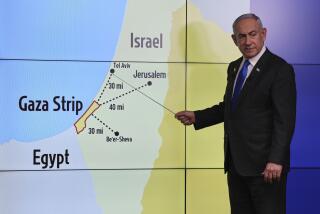Pressure for direct Israeli-Palestinian talks builds
Reporting from Jerusalem — Pressure intensified for a resumption of direct peace talks between Israel and the Palestinian Authority on Sunday, but Palestinian leaders continued to insist that Israel first freeze settlement construction in the West Bank.
Israeli Prime Minister Benjamin Netanyahu said he would travel to Cairo this week to solicit help from Egyptian President Hosni Mubarak in persuading the Palestinian Authority to resume direct talks.
The overture follows Netanyahu’s decision last week to accept President Obama’s call to move from so-called proximity talks, in which U.S. special envoy George Mitchell is the intermediary shuttling between Jerusalem and Ramallah, into face-to-face negotiations.
Mitchell is expected to meet the Palestinian Authority leadership this week to present some Israeli concessions — expected to include increasing the Palestinian role in handling West Bank security — that the Obama administration hopes will be enough to persuade Palestinian Authority President Mahmoud Abbas to drop his opposition to direct talks.
Abbas dismissed last week’s calls for another round of direct talks as “pointless.” The Palestinians want Netanyahu to stop all Israeli construction in the West Bank, occupied by Israel in1967, beyond the current pause as a condition for coming to the table.
But the sense of momentum was fueled by a public meeting Sunday between Israeli opposition leader Tzipi Livni and former Palestinian Authority Prime Minister Ahmed Korei in Jerusalem. Two years ago, Livni and Korei had a standing rendezvous at Jerusalem’s King David Hotel at least twice a week to hash over hotly disputed issues such as borders, refugees and the future of Jerusalem.
Their return engagement on the same stage for the first time since 2008 caused a mini-stir, as they grappled with where negotiations should resume. They agreed substantial progress had been made on major issues when the talks broke down and any future discussions should pick up where they left off.
“The Annapolis process didn’t fail,” Livni told the forum, referring to a November 2007 Mideast peace conference in Maryland. “It didn’t end. It was stopped. It needs to continue.”
edmund [email protected]
More to Read
Sign up for Essential California
The most important California stories and recommendations in your inbox every morning.
You may occasionally receive promotional content from the Los Angeles Times.










